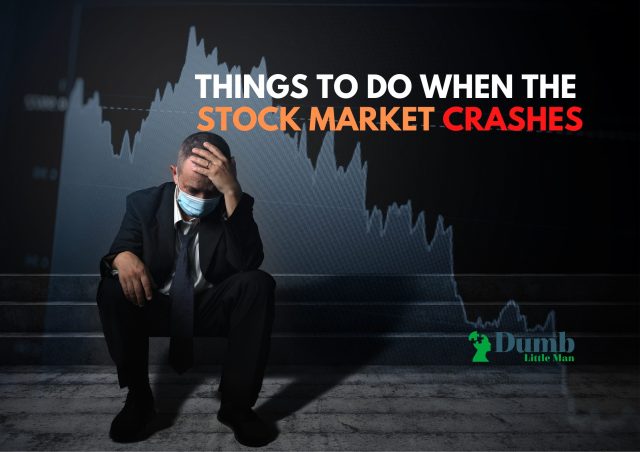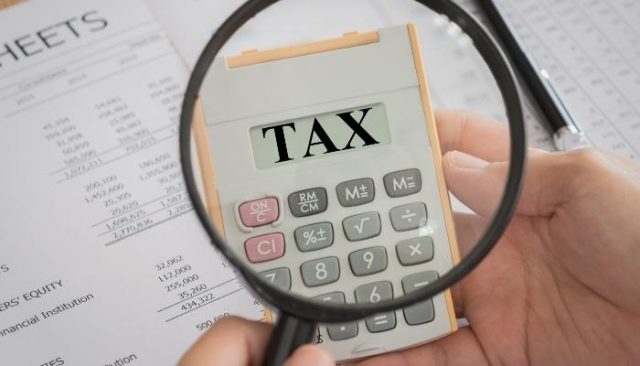7 Important Things To Do When Stock Market Crashes (2024)
By Wilbert S
January 10, 2024 • Fact checked by Dumb Little Man

Want to jump straight to the answer? The best Stock Brokers are Tradestation and Tradier
The #1 Stocks and Forex Trading Course is Asia Forex Mentor
We are all concerned about money. It’s understandable to be worried about having little or no money. But we are also concerned when we have money. This is particularly true if our money is invested in stocks and the market crashes. During the first wave of the COVID-19 pandemic in 2020, financial markets fell sharply, catching most investors off guard.
No matter how distant, every investor is concerned about the possibility of a massive economic disaster. It has occurred previously. It may happen again. Years of hard-earned savings and retirement money might be wiped away in hours if this happens. Fortunately, you can protect most of your assets from a market catastrophe or worldwide economic crisis. A good defensive plan consists of preparation and diversity. They can work together to help you withstand a financial storm.
When the stock market falls, no matter how well you plan, it affects your investments. Many experts mention things to prepare for if the stock market falls, but what happens afterward? There aren’t many specialists who have come up with excellent remedies. This article explores some important things to do in case of a stock market crash. It will also discuss the best forex trading course to help you out. So let’s move ahead!
7 Important Things to do when Stock Market Crashes
#1. Trust in your Investing Strategy

A fear-based response to a transitory downturn is not a good basis to sell an investment. However, reviewing your initial stock research notes may reveal some compelling reasons to sell.
Thorough stock research entails keeping a written record of the strengths, flaws, and purpose of each investment in your portfolio and the factors that would cause each asset to be placed in the “out” box. Your research is like a road map for investing, a physical reminder of what makes a company worth owning.
This article may save you from throwing away a perfectly good long-term investment during a market downturn just because it had a terrible day. On the other hand, it gives compelling reasons to sell a stock.
Before investing in stocks, you should have determined your risk tolerance or how much volatility you’re ready to tolerate in exchange for larger potential rewards. Investing in the stock market is always risky, but what makes for good long-term returns is the capacity to ride through the bad times and stay involved for the inevitable rebound, which is historically on the horizon.
#2. Diversification

Diversifying your portfolio is most likely the single most essential thing you can do to protect your money from a severe bear market.
Depending on your age and risk tolerance, you may be able to invest the majority of your retirement assets in individual stocks, stock mutual funds, or exchange-traded funds (ETFs).
However, if a crisis appears, you must be prepared to relocate at least a part of that money into something safer.
Individuals may now invest their money in various products, each with its degree of risk: stocks, bonds, cash, real estate, derivatives, cash value life insurance, annuities, and precious metals, to name a few. You may also experiment with different assets, such as a minor stake in a producing oil and gas production.
When the market falls, your outcomes may differ — and maybe for the better — if you’ve spread your money among multiple asset types such as stocks and bonds. Diversification, or extending your money among assets, is critical for lowering investment risk and smoothing the ride during a volatile market. Diversification ensures that your assets (eggs) are not too concentrated in a single asset category (basket). As a result, if one company or sector has a terrible day, your other assets may be able to compensate for the losses.
Diversification is already built in if you choose a “set it and forget it” technique, such as investing in a target-date retirement fund, which many 401(k) plans enable you to do, or utilizing a Robo-advisor. In this instance, you should sit tight and believe your portfolio is prepared to weather the storm. There may still be some severe short-term jolts, but this will help you prevent losses from which your portfolio cannot recover.
#3. Focus on Long Term

It’s vital to remember that selling assets during a slump locks in your losses. Consider the COVID-related market catastrophe in February 2020. Assume you had $1,000 in an exchange-traded fund (ETF). During the spring 2020 market crash, such a fund would have lost more than 30% of its value. If you’d sold, you’d have locked in that 30% loss, but if you’d hung on, you’d have recovered your losses by August and seen them rise since then.
If you want to rejoin the market at a more favorable period, you will most likely pay more for the opportunity and forego a portion (if not all) of the rebound profits. Instead of panic selling, take the time to evaluate your assets. Ascertain that your theory is unaffected by any economic downturn or political factors that may have prompted the market sell-off. If not, it may be time to sell the stock to make room for greater chances.
#4. Evaluate your Portfolio

Portfolio rebalancing is a method for lowering overall risk in your investment portfolio to produce higher risk-adjusted returns. This method entails purchasing and selling assets regularly to ensure that each asset class’s weight remains consistent with your goal allocation.
So, an asset allocation plan is the first step toward rebalancing your portfolio. A stock market crisis is an excellent time to assess your current assets if you don’t already have an asset allocation strategy. When evaluating your present assets, consider the following crucial factors:
- What investments do I have – mutual funds, stocks, bonds, gold, etc.?
- How much are my assets worth?
- What are my financial objectives?
- What should I prioritize while constructing my investment portfolio – steady returns, capital growth, and so on?
You can correctly determine your present condition if you have answered these questions and have a goal allocation for various asset types. Then you may decide which assets to acquire or sell to meet your asset allocation goal.
Rebalancing your portfolio correctly can not only help you remain on track to meet your financial objectives, but it will also help you manage overall portfolio risk when markets are turbulent. However, rebalancing your portfolio during a stock market downturn may not be wise. Instead, try waiting for markets to calm down before rebalancing your investing portfolio.
#5. Consider Tax-Loss Harvesting

If you apply this common approach, you may be able to transform your stock market losses into tax-free gains.
Investing in the stock market allows your money to work for you. You may gain from capital appreciation if you acquire a stock at a low price and it rises in value. Those are when you want to celebrate your wins, but stock market returns aren’t assured on every investment.
If you sold stocks in 2023, you might have seen the other side: stock market losses. Although losses don’t look good in your investment account, they may help you save money on your taxes if you use tax loss harvesting.
You must prepare for two scenarios in the stock market: winning and losing money.
You must pay capital gains taxes if you earn money in the stock market. These taxes are levied if you sell a stock for more than what you bought. Assume you purchase a stock for $100 and sell it for $400. You’ve made a $300 profit. Your gain might be short-term or long-term, depending on how long you kept the stock before selling it.
Losses are the other side of the coin. Although you may attempt to prevent losses, you must be aware of what occurs if you are ever in that circumstance. Assume you purchase a stock for $400, and the stock price falls to $100. You will not experience a true capital loss unless you sell the shares.
The IRS will not force you to pay taxes on stock market losses. Furthermore, you can deduct your losses from your winnings on your tax return. We’ll get into it later.
#6. Take Advantage of Smart Investment Opportunities

The responses are always the same: the stock market never goes to zero, the economy always rebounds, and stock values rise to new all-time highs.
While short-term volatility is unavoidable when investing in stocks, how this volatility impacts you is entirely up to you. These fluctuations in the stock market should not disturb you if you are investing for the long run.
So, if you are investing for the long term, you should have a level head and ignore market changes.
While stocks are cheaper when stock markets fall, it is important to use caution while making these trades. One strategy to gain from decreasing equity costs is to rebalance long-term assets such as National Pension System (NPS) and Unit Linked Insurance Plans (ULIPs). NPSs and ULIPs are both long-term investments that have multi-year lock-in periods.
A stock market fall is an excellent chance to boost your equity allocation at a cheap cost and to transition from a more cautious asset allocation to a more aggressive asset allocation. This is due to the unrivaled capacity of equity investments, particularly when acquired at low values, to enhance your investment returns for long-term objectives such as retirement.
#7. Prepare for the Next Stock Market Crash

A stock market meltdown is never good news for short-term investors and is usually upsetting. The most prevalent cause is that the money engaged in the market is obtained as a loan or by submitting real assets. We do not advise marketers to invest in the stock market until they have saved enough for the next five years.
A stock marketer must be informed and understand the stock market’s volatility. Blindly investing in the stock market is risky and will result in significant losses. If you are currently investing in stocks, be sure you have enough fuel to last if the money is taken away. One strategy I do is to invest money in the stock market that is irrelevant to me. So, even if the money is lost tomorrow, I still have a steady source of income.
Best Stock and Forex Trading Course

Asia Forex Mentor offers the best forex trading education in Asia. The course is set up so that you can earn money while learning. You’ll be able to trade forex profitably with a skilled trader’s help. In Singapore and other sites worldwide, tens of thousands of people from the United States, the United Kingdom, and other Asian countries have been taught.
Ezekiel Chew’s teaching method is founded on the principle of return on investment, which states that if you invest $1, you will gain $3. It’s not about zany strategies or elaborate procedures. Professional traders and financial organizations use his authorized system. He is the driving force behind the growth of various companies, including DBP, the Philippines’ second-largest state-owned corporation.
Due to his strategy’s effectiveness, many full-time traders have joined the program with little to no prior trading experience and emerged successful.
| RECOMMENDED TRADING COURSE | REVIEW | VISIT |
|---|---|---|
 | #1 Forex, Crypto and Stocks trading course. Ranked most comprehensive by Investopedia and Best by Benzinga. Free to Try! |  |
Best Stock Brokers
| Broker | Best For | More Details |
|---|---|---|
 | Advanced Traders Read Review | securely through Tradestation website |
 | Intuitive Platforms Read Review | securely through Tradier website |
 | Powerful Services at a Low Cost | securely through Tradezero website |
 | Professional Forex Traders Read Review | securely through Interactive Brokers website |
Conclusion: Things to do when Stock Market Crashes

A stock market crisis gives investors a once-in-a-lifetime chance to increase their fortune. However, you must prepare ahead of time to capitalize on this collapse. The seven tactics outlined above are intended to assist you not only weather a market meltdown better but also to ensure that you can dramatically expand your wealth when markets rebound later.
If you’ve never experienced a stock market crash, you may be reluctant to execute your plans because of fear or worry caused by the continued decline. That is something to take notice of and remember in the future. Every crash is unique, but you may acquire a better sense of each one.
When the market has recovered or is on a clear route to recovery after a crash, it’s a good moment to evaluate how you did.
Things to do when Stock Market Crashes FAQs
Why is US stock market crashing?
A stock market collapse is driven by a sharp decline in stock values and widespread fear. This is how it works: Stocks are shares of a corporation purchased by investors who benefit through their rise in value. How well a company is expected to perform in the future is what determines the value of its shares. As a result, if investors believe the firm in which they have invested is in trouble, they sell the shares and take an exit before the value declines.
Fear plays just as large a part in a stock market meltdown as the underlying economic difficulties.
What are the biggest stock market crashes?
The most recent collapse that many investors are still thinking about is the one triggered by the COVID-19 outbreak. As a result of the virus, worldwide governments shut down whole economies to prevent its spread, triggering an economic shock that shook investors.
Unlike the previous crashes on this list, this one happened rapidly and recovered promptly. The market dropped 34% yet recovered its high in 33 days, an unusually quick reversal. Previous collisions have resulted in a slower descent and subsequent recovery.
The Subprime Mortgage Crisis of 2008
The source of the disaster was banks’ lax lending procedures for mortgages (especially subprime mortgages), which had a knock-on impact across the economy, culminating in the greatest crash since the Great Depression. “It was a very particular trigger.” “There were particularly bad loans in the home market,” says Linda Garcia, founder of the financial counselling firm In Luz We Trust.
The market took almost 17 months to recover. When it did, one of the longest and most lucrative bull runs in history started in 2009 and continued until 2020, when the COVID-19 epidemic began. Market confidence is strong during bull markets, and investors are ready to acquire equities. In bear markets, the reverse is true.
Wilbert S
Wilbert is an avid researcher and is deeply passionate about finance and health. When he's not working, he writes research and review articles by doing a thorough analysis on the products based on personal experience, user reviews and feedbacks from forums, quora, reddit, trustpilot amongst others.


